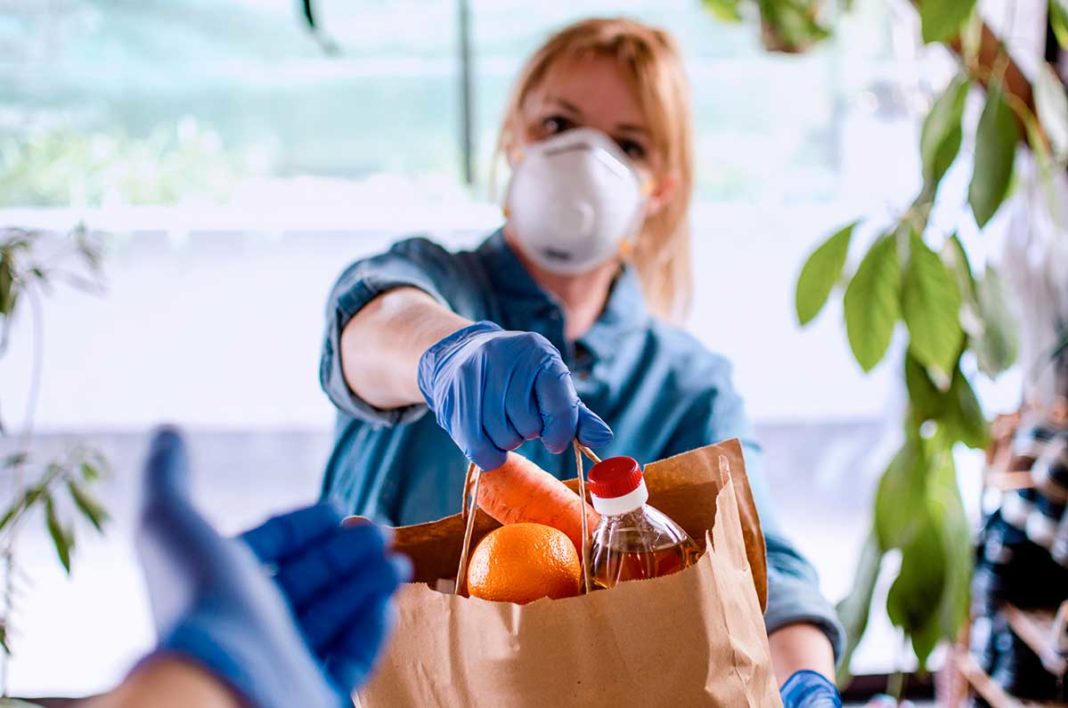MINDEMOYA – Manitoulin Family Resources (MFR) and its many divisions (the violence against women (VAW) shelter Haven House, the food bank and the thrift store) have all seen a great deal of changes during the COVID-19 pandemic, and not in their favour. But MFR, serving Manitoulin and area since 1984, is hoping that government funding being offered through the Manitoulin-Sudbury District Services Board (DSB) could help.
Marnie Hall, MFR executive director explained to The Expositor that when Haven House was first built in 1984, it was created for a capacity of 10 women and children. With new physical distancing rules in place that must be adhered to because of the COVID-19 pandemic, that original template no longer works and shelter capacity has been reduced. Ms. Hall admitted that trying to secure safe quarters to extend shelter space has been difficult both in terms of ensuring the safety of a woman or family in off-site premises but this also is sometimes difficult in terms of having to compete with seasonal tourists for rooms in the hospitality sector, which are a hot commodity during the summer months and which are also often the first choice for MFR when alternative shelter is sought out.
“This is definitely a priority for us,” Ms. Hall said regarding shelter beds.
In pre-COVID times, the food bank would see an average of 300 people accessing its services each month. At its highest monthly peak during the pandemic, 1,500 people accessed the food bank and for three other months in a row, that number topped 1,000, Ms. Hall shared. That number has stabilized since phase three of Ontario’s re-opening took effect, but the executive director worries about the second wave.
“We know from previous recessions that it takes about 18 months for the highest need to reach our doors,” Ms. Hall said, noting that we’re just six months into Canada’s worst recession since the Great Depression.
“We’re already planning for Christmas,” Ms. Hall continued, adding that, “we intend to deliver Christmas” regardless of what December might bring. Last year’s Christmas hamper counts set yet another new record for MFR at just over 1,050. Ms. Hall said they expect that figure again, or greater this year.
With the closure of MFR’s thrift store since the pandemic’s start (this was because of social distancing concerns), this has meant a hit to MFR’s, and the food hampers’, coffers and donations are gladly accepted for this year’s hamper campaign.
MFR had indicated to the DSB that the hoped-for phase two Social Services Relief Fund ((SSRF), through the Ontario Ministry of Municipal Affairs and Housing) funding would allow the organization to build an expansion where community-based counsellors could provide safe services to both Haven House shelter residents and those still in the community who may need to be linked to the shelter service.
It would further provide for continuity of agency business in the event of a COVID-19 outbreak in the shelter with all non-shelter staff prevented from entering the building. An access point for Haven House clients to meet with victim witness assistance program staff, Victim Services staff, and other relevant community service providers is an additional hoped-for expansion that could be funded by the SSRF program.
Should the retrofit funds be granted, MFR would again have 10 beds under its roof, safely distanced.
MFR also shared with the DSB that funding for a new food bank/thrift store would allow the resumption of the much-needed services that make inexpensive household goods and clothing available to the public, as well as meeting the much-expanded needs of the food bank and its larger client base.
On Thursday of last week, the DSB gave its approval to a funding application for phase two of the SSRF. MFR had already been the recipient of phase one SSRF funding to create temporary homeless shelters.
As explained to the DSB by Donna Moroso, the organization’s director of integrated social services, the objective for phase two of SSRF funding is threefold and is designed to mitigate ongoing risk for vulnerable people, especially in congregate care settings. The first objective, where appropriate, is to support changes to the physical design of congregate spaces, permit physical distancing and other modifications based on public health guidance; and provide ongoing services and supports to address immediate pandemic needs of vulnerable people. The second initiative will encourage longer-term housing-based solutions to homelessness, post-COVID-19, and use funding in ways that create longer-term housing solutions, move towards client service models that are innovative, and support client and organizational readiness for potential future outbreaks or emergencies. The third objective is to enhance rent assistance provided to households in financial strain due to COVID-19, giving consideration to using the funding to support renter households who may be in rental arrears and at a high risk of becoming homeless.
It was announced that the DSB could qualify for $897,838, pending approval of its business case.
“The Manitoulin-Sudbury DSB staff reached out to the executive director of the MFR agency to discuss the SSRF phase two funding and whether or not they would have any need for the funding for potential shelter, food bank and/or thrift store demands,” Ms. Moroso explained.
MFR indicated that capital funding for retrofit of the VAW residential shelter would be required to address required physical distancing, and that required isolation/quarantine area expansion would allow for new admissions as well as care for ill individuals, the ability to cohort clients, to transform office spaces into new bedrooms and bathrooms, and to allow for needed client capacity (individuals not sharing rooms if not family) and reducing likelihood of transmission of COVID-19 or other communicable diseases from community-based counsellors, the finance department and administration staff into VAW shelter space through separation of MFR’s two HVAC systems, and separation of program staff.
Should the SSRF monies flow, the larger food bank/thrift store building would meet the physical distancing requirements, air flow, capacity, and disinfection/health and safety needs of the building’s attendees, as well as the capacity of the ever-growing client numbers. Incorporating the purchase of a cargo van would allow for the expanded delivery of needed household goods, clothing, and food into the communities throughout their service region, to access points such as already-existing food banks in Espanola, Massey, Markstay, Killarney and Chapleau.
Ms. Hall offered the scenario of the MFR thrift store having an abundance of winter coats and the Espanola store needing some. The cargo van could then deliver these goods to other area service partners. Ms. Hall reminded this newspaper that the MFR catchment area includes all of Manitoulin and Espanola.
Ms. Hall commended her staff in every department for their hard work and determination during the COVID-19 pandemic, realizing that many sacrifices had to be made to keep all their clients safe.
“While we hope to get this money, we will continue to look for ways to expand capacity in other ways,” Ms. Hall said, thanking the DSB for their help.





